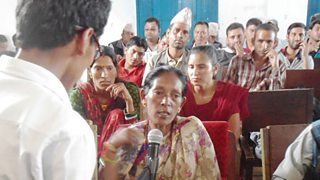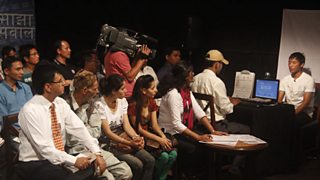Vote of confidence
Sushama Pandey
Production Training Officer for �������� Media Action in Nepal
Tagged with:
I remember the first time I voted. It was five years ago and I was so excited as I travelled 12 hours by bus at night and then walked two hours to my home district to cast my vote.
Nepal's historic elections of 2008 saw the abolition of the centuries-old monarchy and for young Nepalis like me, we hoped it would mark the beginning of a more peaceful and prosperous time for our country.
But five years later, our excitement turned to despair when Nepal’s constitution assembly was dissolved without agreeing a new constitution.
This November, we're heading to the polls again and despite such disappointment, I still find myself looking forward to casting my ballot. And two remarkable women I spoke to recently have made me value my chance to vote all the more.
Marginalised voices
60-year-old Supari Badi and 20-year-old Mina Nepali live in the small town of Mangalsen in the remote far west of Nepal. Both widows, they belong to the Dalit community, one of the most marginalised groups in Nepal.
I spoke to Supari and Mina after another woman from their community called Mangala BK brought them to take part in the radio programme Sudoor Sawal. (In Nepali, sudoor means 'far' and sawal, 'questions'.)
The debate show brings together officials and leaders together to answer questions from a local audience. The programme is broadcast on local station Radio Ramaroshan where �������� Media Action has been training producers and running workshops.
We had approached Mangala BK to help us with recruiting women from her community, who are often very reluctant to speak in public.

Mangala BK taking part in Sudoor Sawal. Supari and Mina are sitting behind her.
The Sudoor Sawal programme that week was about how people could register their names on Nepal’s electoral roll so they can vote in the upcoming elections.
Not only were Supari and Mina's names not registered on the electoral roll but they also didn’t have the citizenship certificate that you need to register to vote. What's more, without the certificate, they couldn’t claim the monthly allowance that’s available to widows in Nepal.
They had visited their government office more than three times to get the certificate but on each occasion, they were either asked to return with their husbands or told they hadn’t brought the correct documents.
Supari and Mina's problems were bigger than not being able to vote in the next election: without the allowance, they were going hungry every day.
Access to services
On that programme’s panel was the Acting Chief District Officer and Supari and Mina found themselves for the first time talking to someone who held the power to give them citizenship.
After the programme, Acting CDO Krishna Giri said, "They were women who have never had access to government services. I promised in the recording of the programme that I would support them to get citizenship as soon as possible so that they could get their names registered in the voter list."
And he has stood by his word. Hopefully the allowance Supari and Mina are now going to receive will help them to better make ends meet – and they’ll be able to vote in the next election.
Country-wide response
The story doesn’t end with Radio Ramaroshan.
Another of our partner stations, Dinesh FM in the far west of the country, recruited an election officer to be on the panel for the recording of the version of the debate show which is called Sajha Manch (Common Forum).
For a few hours that day, the election officer even set up his own office in the station so people could register there. In the days after the broadcast, more than three times the usual amount of people came to register their names on the roll.
This idea of setting up a mini election office was also taken up by the national version of our debate programme Sajha Sawal which is broadcast on primetime TV as well as national radio.
One of the audience members – a man called Rudra Pun – travelled from the west of Nepal to take part in the show, which recorded that week on location in a restaurant in Kathmandu.
"I went to election office in Lalitpur three times," he said. "Every time I went, there happened to be a strike [called by a political party not taking part in the election]. Afterwards I was busy so could not get my name registered."

During the programme, Rudra had his photo taken and details recorded to register his name – as did the waiters in the restaurant!
First voter
But the final word must be Mina’s.
After the Sudoor Sawal recording finished in Manglasen, she told me in a happy and excited voice, “When I came to know about the importance of the election and my vote through Sudoor Sawal, I so much wanted to be a part of the election.”
After she got the citizenship she said, “Previously I was hopeless. I did not expect I would get citizenship and get my name registered on the voter list."
November will be the first time she'll cast her vote. And I've no doubt she’ll be as excited as I was five years ago.
Related links
Follow �������� Media Action on and
